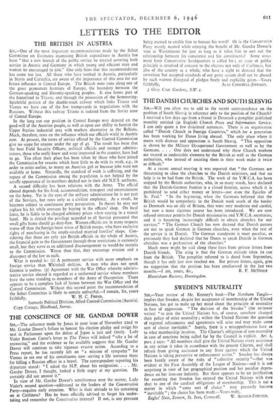LETTERS TO THE EDITOR
THE BRITISH IN AUSTRIA
St,—One of the most important recommendations made by the Select Committee on Estimates examining British expenditure in Austria has been "that a new branch of the public service be created covering both service in Austria and Germany in which young and efficient men and women be encouraged to join." One only fears that this recommendation has come too late. All those who have worked in Austria, particularly in Styria and Carinthia, are aware of the importance of this area for our future influence in Central Europe. The British zone runs along one of the great permanent frontiers of Europe, the boundary between the German-speaking and Slavonic-speaking peoples. It also forms part of the hinterland to Trieste, and through the possession of the Semmering- Spielefeld perticn of the double-track railway which links Trieste and Vienna we have cne of the few trump-cards in negotiations with the Russians. Without this railway Trieste is isolated from the Soviet zone of Central Europe.
In the long run our position in Central Europe may depend en the good-will of the Austrian people, as well as upon our ability to furnish the Upper Styrian industrial area with markets alternative to the Balkans. Much, therefore, rests on the influence which our officials wield in Austria now. At present, the terms of service offered by the Control Commission give no scope for anyone under the age of 45. The result has been that the best Field Security Officers, political officials and younger adminis- trators, those who really knew and were interested in the country, have had to go. Too cften their place has been taken by those who have joined the Commission for reasons which have little to do with its work, e.g., in order to retire earlier, to marry an Austrian girl or because jobs were not available at home. Naturally, the standard of work is suffering, and the repute of the Commission among the population is not helped by the scruffy appearance of its members decked out in their old N.F.S. uniforms.
A second difficulty has been relations with the Army. The official abroad depends for his food, accommodation, transport and entertainment on the Army. Yet in the eyes of the military administrator he is not part of the Services, but rates only as a civilian employee. As a result, he becomes subject to continuous petty persecution. In theory he may not replace his kit while overseas by buying in the officers' shop. On local leave, he is liable to be charged arbitrary prices when staying in a transit hotel. He is denied the privilege accorded to all Service personnel that small gifts home should go duty-free. Women officials are in many respects worse off than the foreign-born wives of British troops, who have exclusive rights cf purchasing in the amply-stocked married families' shops. Con- sidering that there are only 550 British officials in the whole of Austria, the financial gain to the Government through these restrictions is extremely small, but they serve as an additional discouragement to would-be recruits to the Commission. Worse than that, they encourage evasion and a disrespect of the law as such. What is needed is: (t) A permanent service with more emphasis on foreign service than Whitehall abilities. A man who does not speak German is useless. (2) Agreement with the War Office whereby adminis- trative service abroad is regarded as a uniformed service whose members have the same standing as members of the Army of Occupation. There appears to be a complete lack of liaison between the War Office and the Control Commission. Without this second point the recommendation of the Select Committee is likely to remain unfruitful.—! remain, Sir, yours formerly Political Division, Allied Control Commission (Austria). Copp Cottage, Hindhead, Surrey.


































 Previous page
Previous page